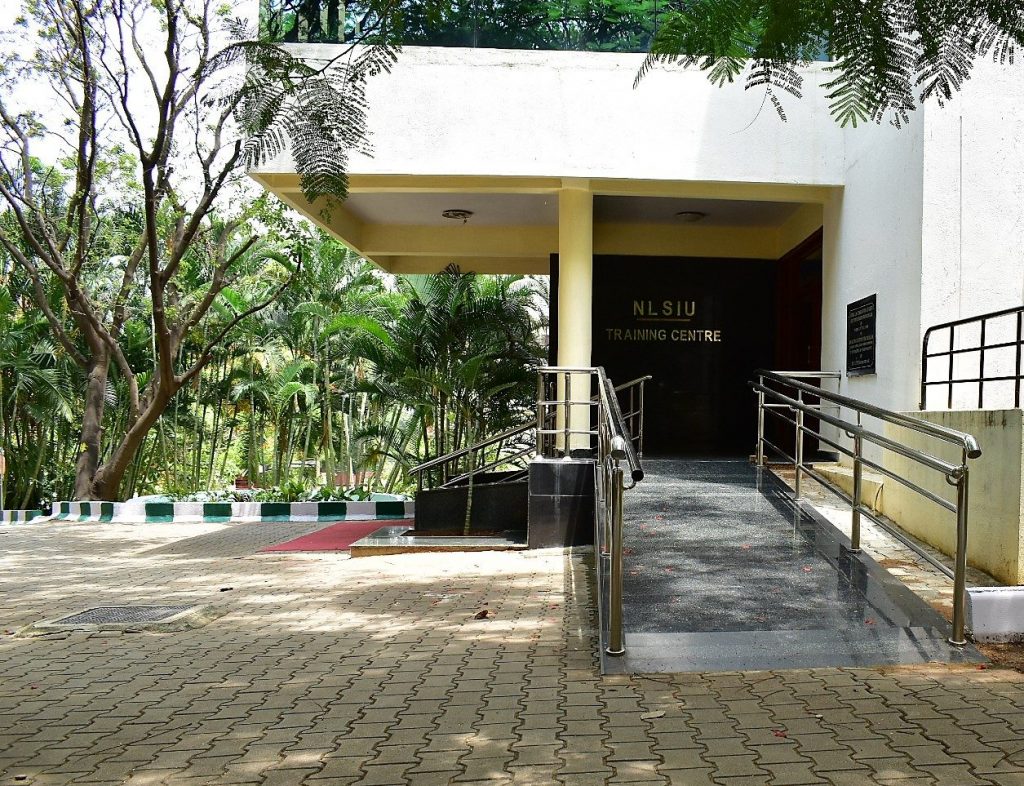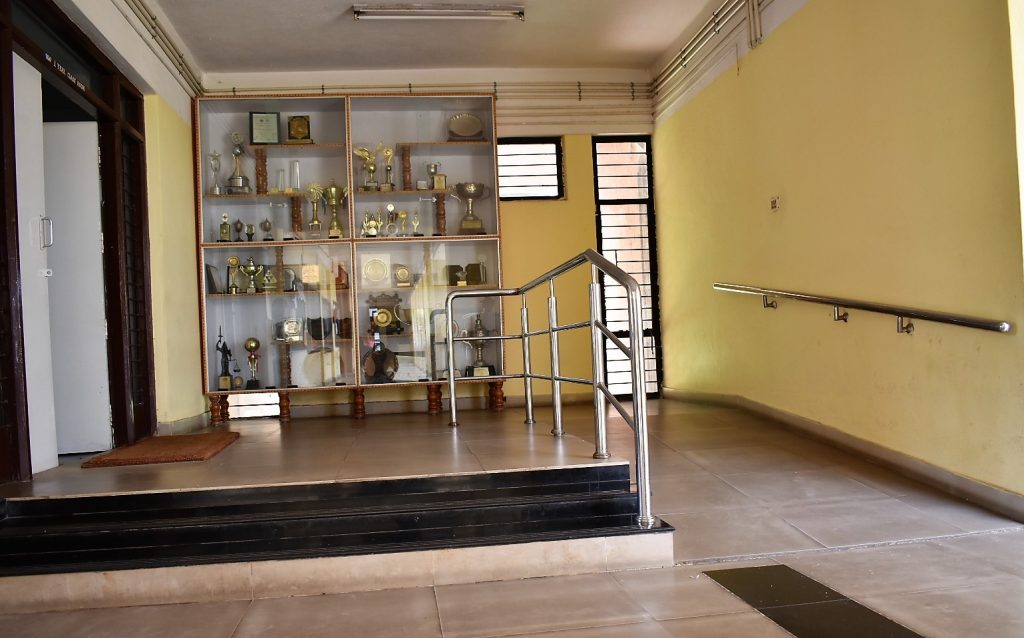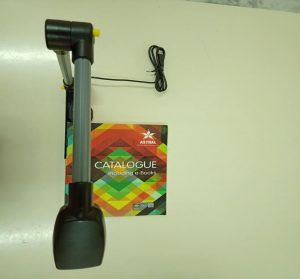Giving Month | Reducing Barriers: Accessibility at NLSIU
February 17, 2022
Giving Month is an initiative to provide the alumni community updates on key initiatives at NLSIU, and invite their support in jointly achieving the University’s development goals.
Each week of February will delve deeper on a separate focus area for the University’s development. This week’s focus is Sustainability & Student Welfare. To contribute to these initiatives at NLSIU, please click here.
NLSIU strives to provide an accessible working and learning environment for students, faculty, staff and visitors with disabilities. Apart from making the physical infrastructure and its basic facilities accessible, the University has implemented advanced assistive measures, including technology-enabled services to enrich the learning experience of persons with disabilities on campus.
Built Environment on Campus
As NLSIU develops the campus in line with the Redevelopment Master Plan, accessibility will be a crucial focus during further interventions.
“With the aim to create an inclusive and collaborative campus, universal accessibility is of paramount importance and will be addressed as an active component of design. In addition, special attention will be paid to natural surveillance on campus along with improving the movement corridors (spaces involving frequent movement) and access to buildings. Within the buildings itself, guidelines on access and material selection will be addressed,” said Jahnavi J Ashar and her team at Venkataramanan Associates, the Master Plan architect.
For instance, the University will introduce tactile pathways as part of the redevelopment of its campus. Tactile paths usually have a textured surface, and provide secure directions, both in open spaces and inside buildings, for persons with visual impairments.
 Accessibility is the first step towards universal design of physical infrastructure, and the University has been steadily working on increasing this on campus. Ramps/lifts have been installed for users with reduced mobility in the Academic Blocks, Hostels, Library, Learning Centre, and Training Centre and along inclines/ steps on the connecting pathways.
Accessibility is the first step towards universal design of physical infrastructure, and the University has been steadily working on increasing this on campus. Ramps/lifts have been installed for users with reduced mobility in the Academic Blocks, Hostels, Library, Learning Centre, and Training Centre and along inclines/ steps on the connecting pathways.
Seating arrangements with an accessible approach have been provided on the ground floor in the Academic and New Academic Block, as these spaces are used by full-time students as well as visitors who appear for competitive examinations hosted on the NLSIU campus. The University can assist with transportation from the external gates into the campus, as well as within the campus. Specially designed accessible washrooms have also been constructed in the Academic Blocks, Library and Hostels. Accessible accommodation for residential students is provided on the ground floor of the Hostels.
Inclusive Academic Measures
 Digital access to books/journals/study material is available to students and faculty through the University’s Library website and the students’ Learning Management System (LMS). The LMS is also facilitated by use of Braille software. Students with limited or poor access to the internet and other related facilities receive financial subsidies to ensure ease of access.
Digital access to books/journals/study material is available to students and faculty through the University’s Library website and the students’ Learning Management System (LMS). The LMS is also facilitated by use of Braille software. Students with limited or poor access to the internet and other related facilities receive financial subsidies to ensure ease of access.- During examinations, the University provides scribes for visually impaired students as per their requirement. During the pandemic, the examination process for full-time programmes as well as the remote and online programmes offered by PACE was facilitated via the LMS and arrangements were made to make the process accessible to students with disabilities. Laptops are also made available for students who experience difficulty in writing.
- For online classes, students with visual impairments receive scanned, screen-reader friendly material in advance. Faculty members provide reading materials in formats compatible with accessible software. Additionally, class recordings are shared with students on a need-basis.
Library Facilities and Services

Librarian In-Charge at the Sri Narayan Rao Melgiri Memorial Law Library, Dr. Mahesh Yarnal explained, “The Library team meets with students with disabilities periodically to understand their requirements and provide necessary assistance and resources. We also help them navigate through the material and technology support available. A separate room for students with visual impairments has been allocated in the Library since 2017, where we help them convert materials into a readable format. Students also use the room for meetings and collaborative work. We also make arrangements and bring in experts to train visually impaired students in MS Office on a need-basis.”
The Library has a digitized Online Public Access Catalogue (OPAC), which provides access to details of books and other material available in the library. Computer accessibility tools like Screen Reader, Screen Magnification, and Web-Braille system are also available. A recent grant received by the University is being utilised to further improve on the existing resources by providing more screen readers and speech-to-text support for library users.
Further services are available for students with disabilities through technology-enabled support, such as:
- DAISY (Digital Accessible Information System), a complete audio substitute for print material and specifically designed for use by people with disabilities, including blindness, impaired vision, and dyslexia.
- JAWS (Job Access With Speech) Talking Software and Screen Reader, which reads out all the matter on the computer’s screen through its speakers/headphones, thus enabling a visually challenged person to use the computer independently and work on all MS applications.
- Pearl Reading Camera or Instant Reader, a high-tech instant reading camera device that is connected to a computer/ laptop and converts it into a portable high-speed reading system.
- Angel Pro, an all-in-one device that is used for recording classroom lectures, and to listen to scanned academic data, or data downloaded from the internet. It also provides assistance by reading out the content on the device.
- Zoom-Office, a software programme that works with a text scanning camera and video magnifier to read aloud books, magazines, newspapers, documents, prescription labels and other printed material in a variety of voices and languages.
To contribute and read more updates on NLSIU’s sustainability and student welfare initiatives, please click here.
To read other ‘Alumni Giving Month’ features, please click here.

